
Information and Orders: 1-406-259-9004
Hours: Mon - Sat 10-6 MST
Central Hobbies
1401 Central Avenue
Billings, MT 59102
We Gladly Accept:

as well as

PLASTIC MODELS : AIRPLANES / HELICOPTERS
Shipping cost will vary by dimensions
or weight please call or email for shipping quotes.
- Page 11 of 12 | 140 Total Products
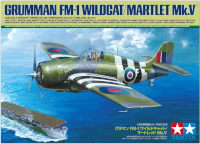
TAMIYA 1/48 Grumman FM-1 Wildcat/Martlet Mk.V
Description:
Based upon our popular 1/48 Grumman F4F-4 Wildcat (Item 61034), this kit authentically recreates the FM-1 featuring four machine guns with both the U.S. Navy and Royal Navy markings and one sitting pilot figure.
• 1/48 scale plastic model assembly kit. Fuselage length: 184mm.
• The kit faithfully depicts the wing equipped with four machine guns; parts depict wing top surface without machine gun access door and wing under surface without cartridge exhaust port and with enlarged magazine panel.
• Includes a new rear-view mirror part to recreate the Marlet Mk.V of the Royal Navy.
• Features realistic renderings of fuselage surfaces with panel lines and rivets.
• The complex structure around the main landing gear is realistically recreated.
• Comes with decals to depict 3 marking options: 846th Fighter Squadron, Royal Navy, HMS Tracker (D24), Normandy, June 1944 (*), 58th Mixed Fighter Squadron, U.S. Navy, USS Guadalcanal (CVE-60), North Atlantic, January 1944, 33rd Mixed Fighter Squadron, U.S. Navy, USS Nassau (CVE-16), California Coast , September 1943
• *Invasion stripe: black and white stripe paints on the fuselage and wing of the Allied forces' aircraft to identify allies during the Normandy Landings
• Masking stickers for the canopy, one sitting pilot figure and black-and-white painting guide are included.

Our Price: $35.99
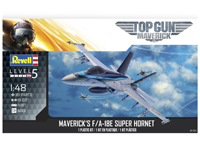
REVELL 1/48 TOPGUN Maverick’s F/A-18E Super Hornet
Description:
Parts: 161
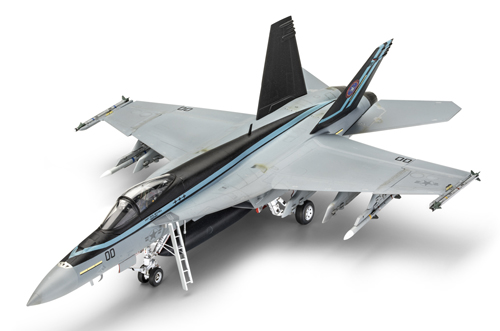
Our Price: $30.95

TAMIYA 1/48 Mitsubishi A6M3/3A (Zeke)
Description:
Following the Zero Model 21 (A6M2), which achieved overwhelming victories against Allied forces in the first half of Pacific War, the summer 1942 saw the introduction of the Model 32 (A6M3) which was powered by a Sakae 21 engine and an 11m wingspan with clipped wingtips. Although top speed increased, its range reduced drastically, therefore the Model 22 (A6M3) was rushed into development in order to correct the Model 32's shortcomings. Overall performance improved as the 12m wingspan and folding wingtips were reintroduced to regain maneuverability and new wing fuel tanks restored range to 2,560km. The Model 22 (A6M3a) which was fitted with long-barreled cannons was also put into production. Deployed mainly to the Solomon Islands from early 1943, Zeroes had fierce battles against U.S. fighters.
★1/48 scale plastic assembly model kit of the Mitsubishi A6M3 Model 22 Zero.
★Length: 190mm, Wingspan: 250mm
★Well-balanced form of the aircraft has been beautifully reproduced.
★Photo-etched parts depict the folded wingtip mechanism
★The A6M3a which was armed with long-barreled cannons can also be assembled.
★You can choose to assemble the cowl flap in either open or closed position. Also, flaps can be depicted in either up or down positions.
★1 seated and 4 standing pilot figures included.
★Comes with 3 kinds of markings including one to depict the aircraft from the 251st Naval Air Group.
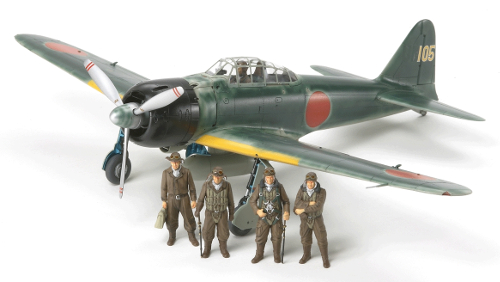
Our Price: $54.99
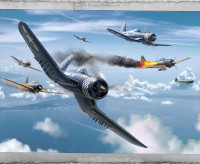
FIELD OF VALOR 1/72 F4U-1D Corsair
Description:

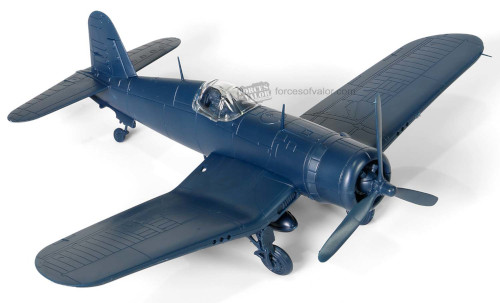
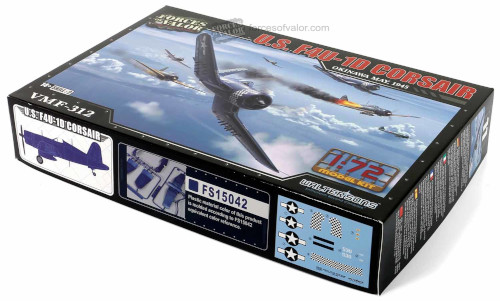
Our Price: $10.99
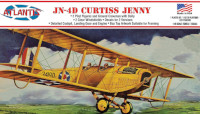
ATLANTIS 1/48 JN-4D Curtiss Jenny
Description:
The Curtiss JN "Jenny" was a series of biplanes built by the Curtiss Aeroplane Company of Hammondsport, New York beginning in 1915. Although the Curtiss JN series was originally produced as a training aircraft for the US Army, the "Jenny" (the common nickname derived from "JN") continued after World War I as a civil aircraft, and it became the backbone of American postwar civil aviation. Pilots found the Jenny's stability and slow speed made it ideal for stunt flyingand aerobatic displays in the barnstorming era. Many Jenny's have been restored and are on display in Air Museums all across the nation.
This kit comes from the classic and very good Lindberg tooling.
Features 2 Pilots with ground crewman and dolly, detailed engine, cockpit and landing gear.
2 decal options including scheme from the Aurora Barnstormers.
Molded in Metallic barstormers Green color.
Classic boxart by Ray Gaedke.
Officially Licensed.
Please note: The 2 very small clear parts are in the main bag of parts. Check the bag carefully and set them aside to assure you do not lose them..
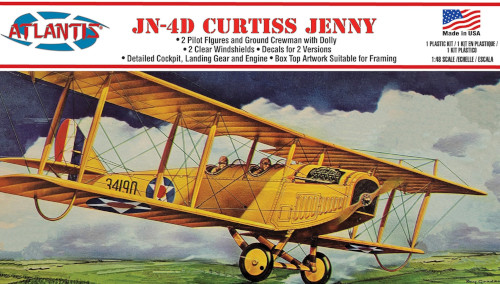
Our Price: $24.99
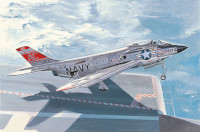
F3H-2 DEMON
Description:
The McDonnell F3H Demon is a subsonic swept-wing carrier-based jet fighter aircraft designed and produced by the American manufacturer McDonnell Aircraft Corporation. It was the first swept wing jet fighter and the only single-engined carrier-based fighter the company produced.
The F3H-2 was the single-seat strike fighter version, retaining Sidewinder and Sparrow capability of the −2M/N and adding payload of 6,000 lb (2,730 kg) bombs or rockets. 239 built. The U.S. Navy placed an order for 239 F3H-2s, the first of which being deployed during March 1956. In 1962, the F3H-2 designation changed to F-3B. During September 1964, the final Demon-equipped squadron, VF-161 'Chargers', traded their F-3s for F-4 Phantom IIs.
- Scale: 1/48
- Length: 15.15" (385mm)
- Wingspan: 8.74" (222.2mm)
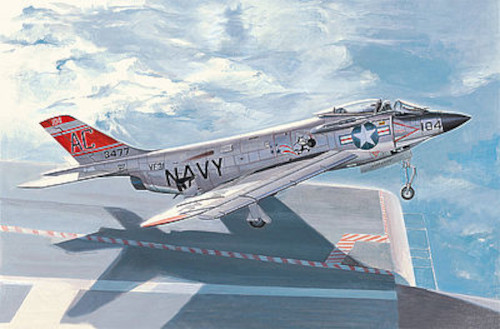
Our Price: $58.45
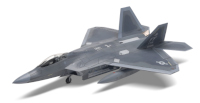
REVELL 1/48 F-22 Raptor
Description:
The production F-22 was delivered in January of 2003. Originally designed as an air superiority fighter, the F-22 has expanded to the role of a ground attack aircraft. All of the F-22 attack weapons are stored internally which helps it to avoid radar detection. In addition the F-22 has vectored thrusters which give it the ability to virtually fly straight up from a stationary position.
• Full complement of on-board weapons with four separate open weapon storage compartments
• Positional rear thrust deflectors and horizontal stabilizers
• Decal with graphics for all the current F-22 squadron commanders aircraft.
• Molded in light gray and transparent yellow
Skill Level: 5
Scale: 1/48
Wingspan: 7.375"
Length: 10.5"
Height: 2.75
Parts: 118
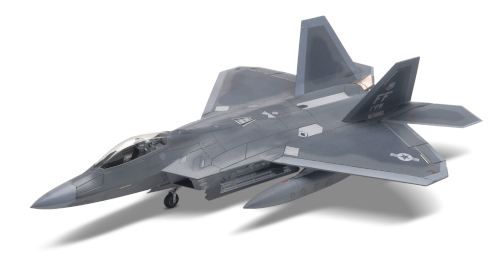
Our Price: $25.95
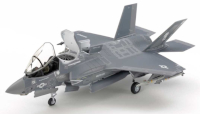
TAMIYA 1/72 F-35B Lightning Ii
Description:
This model kit faithfully recreates the bleeding edge airframe of the F-35B Lightning II. The F-35 Lightning II is a state-of-the-art multirole stealth fighter developed by Lockheed Martin for the U.S. military and selected allies. The fighter has three variants: the multi-role fighter F-35A, the short take-off and vertical landing (STOVL) F-35B, and the carrier-capable F-35C. This 1/72 scale model was manufactured by Italeri in 2019 and now joins the Tamiya 1/72 scale War Bird Series with the addition of Tamiya materials and parts.
• 1/72 scale plastic model assembly kit.
• New packaging and instruction manual designed by Tamiya, plus a brand-new Tamiya figure and decals for markings and panel lines.
• Markings are included to depict a choice of two F-35Bs at the U.S. base in Iwakuni, Japan.
• Parts are included to recreate ordnance such as AIM-120 air-to-air missiles, plus a missile troley.
• Choose between open and closed canopy parts.
• Aircraft and ordnance parts are a product of Italeri.
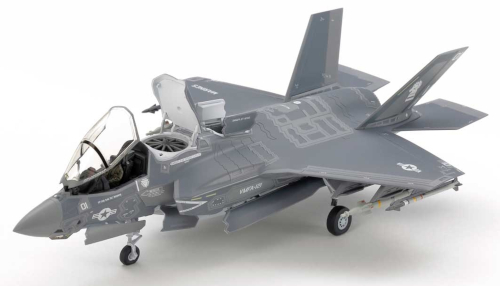
Our Price: $51.99
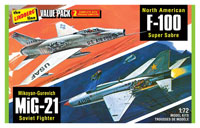
LINDBERG 1/72 Lindberg Vietnam Era Fighters 2 Pack Scale Mo
Description:
One kit each F4G Phantom and A4D Skyhawk plastic model kits.
.jpg)
Our Price: $28.79
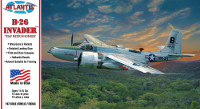
ATLANTIS 1/67 B-26 Invader Medium Bomber USAF
Description:
1/67 Scale. This kit comes from the old Monogram tooling. Comes molded in silver with clear parts and landing gear. Features updated decal sheet and artwork. Skill level 2. Officially licensed with Boeing. During World War II, the B-26 (formerly A-26) was developed by the Douglas Aircraft Company to fill the need for a modern attack plane. It was named the Invader and was the fastest attack bomber of its day. Combining speed, heavy fire-power and bomb capacity, it served well as a straight bomber, nightfighter, skip bomber or as a strafing and attack plane. This model of the B-26 carried eighteen .50 cal. machine guns and 6 rockets in addition to the regular bomb load within the fuselage. The gun turrets in the fuselage were remotely controlled and were aimed by a gunner using a periscope-like sighting mechanism.The Invader had a wingspan of 70 feet and was 50 feet 9 inches long. Cruising speed was in the 300 mph class. Power was supplied by two 18 cylinder, double-row Pratt and Whitney radial engines. Normal crew consisted of 3 men.
Measures 9 inches long with a wingspan of 12.5 inches
39 parts
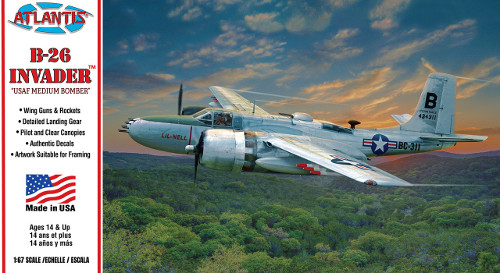
Our Price: $19.99
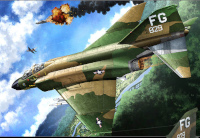
ACADEMY 1/48 USAF F-4C Phantom
Description:
Academy's 1/48 scale Mcdonald Dougles F-4C Phantom
Type C veriant used by the U.S.A.F. in Vietnam
Includes various air-to-air and air-to-ground armament
Typical wide tire and heavy tail used on the C variant
Highly detailed cockpit and landing gear
Fully engraved panel lines and rivet details
Pilot figures included
Cartograf of Italy decals
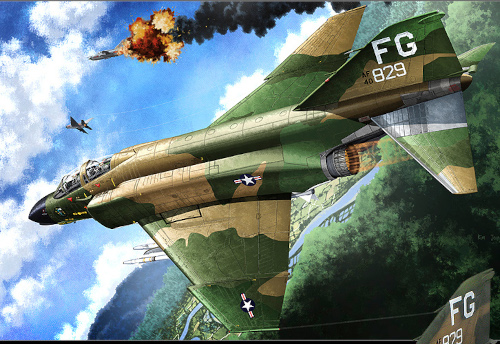
Our Price: $79.99
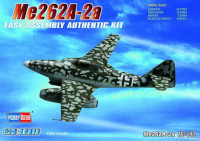
HOBBY BOSS 1/72 Me262 A-2a Bomber
Description:
The Messerschmitt Me262 "Swallow" was the world's first operational jet-powered fighter aircraft. Officially named "Swallow", the Allies called it the “Storm bird”. The Me262 had a negligible impact on the course of the WWII, but its design was highly influential on postwar aircraft development. Its first test flight was in 1941, but didn’t see operational service until July1944. Including all versions, about 1,430 Me262’s were produced.
Length: 147mm
Wingspan: 173mm
Height: 53mm
Total Parts: 44
.jpg)
Our Price: $13.99
- Page 11 of 12 | 140 Total Products